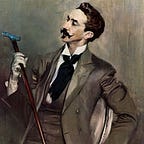Review: Les Amitiés Particulières by Roger Peyrefitte — Social Control in 1940s France
Roger Peyrefitte’s daring debut novel Les Amitiés Particulières (translated in English as Special Friendships) was published in 1943, when depicting a same-sex romantic relationship — while not entirely new — was still controversial. Nonetheless, perhaps a fictionalized account would prove less scandalous than a memoir, which Peyrefitte could have written since the novel is inspired by his life. Later on, as a self-described polemicist Peyrefitte would mind less and less causing outrage with his ideas and actions. Still, Les Amitiés Particulières definitely sparked some debate about the role of religion and outdated social codes that oppressed young people even if it frequently insisted on the ‘innocence’ and ‘purity’ of its protagonists.
The plot of the novel is rather simple. Georges de Sarre, an upper-class teen, is sent by his parents to a Catholic boarding school in the French countryside. There, he develops a crush on his classmate Lucien Rouvère. Lucien, however, already has a boyfriend (a “friend” with whom he has spent summer break and with whom he exchanges love letters and poems), the older student André Ferron. Jealous George makes sure that the principal sees one of these poems dedicated to Lucien, which leads to André being expelled.
Although Lucien is sad, he quickly recovers and hopes to see André again next summer. Georges, similarly, has moved on from his crush on Lucien. He has now developed a liking for Alexandre Motier, a student one year younger whom he observes during mass. After meeting him through his classmate Maurice (Alexandre’s older brother), the two become friends and manage to spend time together in spite of the strict surveillance they’re subjected to at the boarding school.
Their happiness is disturbed by the arrival of a new priest, the Father of Trennes, who stalks students and invites them to smoke in his private room. The Father of Trennes quickly realizes Georges and Alexandre are friends and blackmails Georges into telling him all about it. Bothered by this, George sneaks a note into the principal’s room alerting him that the Father of Trennes invites students to his room. The Father of Trennes is then fired for his inappropriate behavior.
A second stumbling block occurs when they are caught by the Father Lauzon hanging out at an abandoned cabin during their spring retreat. Lauzon blackmails Georges into returning Alexandre’s love letters (which at the time meant they were breaking up). Georges complies unwillingly, and a heartbroken Alexandre commits suicide by drinking poison a few days later during summer break.
The novel’s plot could not have benefitted for a better setting to denounce in a very Foucaldian way (but years before Foucault, of course) the social elements that work against children and queer people. At the boarding school, developing strong friendships (an euphemism for romantic relationships) was strongly discouraged. Students were supposed to focus on their studies and their prayers — there was no room for anything else. Those who deviated from the behavior guidances were expelled, threatened or even blackmailed. At Catholic boarding schools, unlike secular French ones, students were exposed only to literature deemed appropriate by the Church. The cult of child saints was an integral part of the students’ education — they were often told to replicate the virtues of these children of centuries ago who sacrificed themselves for their faith.
Rebellious Georges understood the system and defied it in small and larger ways everyday. He was delighted to learn in Latin and Greek classes of same-sex relationships in history and mythology that supported the idea that these relationships had always existed. He even went as far as professing a preference for Greek mythology over Catholicism. He used his academic brilliance to his advantage, writing about his love for Alexandre in his French class essay, for example, or using the fact that he was the best student in his class to ask for permission to step outside during meals and see Alexandre. When meeting with Alexandre, the two discussed that in spite of society working hard so they would not be together, they would persist.
The tragic ending of the novel captures very well the obstacles involved in growing up gay in a socially conservative environment. Although Georges as a narrator insists multiple times that this relationship is not lascivious in any way (perhaps because stating otherwise would be too shocking for his time), there are still multiple suggestions that their friendship is a romantic relationship. For instance, when told by his cousins that male-only boarding schools lead to some boys taking on the roles of girls to have relationships with other boys, Georges grows frustrated and thinks to himself that Alexandre is not replacing a girl. He loves Alexandre in his male form. In fact, Alexandre’s name takes a special significance when Georges learns of Alexander The Great’s own history of same-sex relationships.
Perhaps, as already stated, one must excuse Peyrefitte’s refusal to outright refer to these special friendships as gay romantic relationships due to the fact that he is writing at a time when same-sex relationships were still a social taboo. Additionally, he is also speaking of his experience as a teen, so any mention of sexuality has other implications for the novel’s reception. And truly, there aren’t much avenues for Georges to spark gay activism as a teenager in 1940s France. Nonetheless, the first half of the 20th century definitely is an era of gay awakening in French literature. From Proust and Gide’s early portrayals of same-sex relationships to Jean Genet’s 1943 novel Notre Dame des Fleurs depicting his autobiographical experience as a gay man in the Parisian underworld, queer writers start to find means to show glimpses of their lives and use their literature to question ideas about gender and sexuality that still are prevalent.
